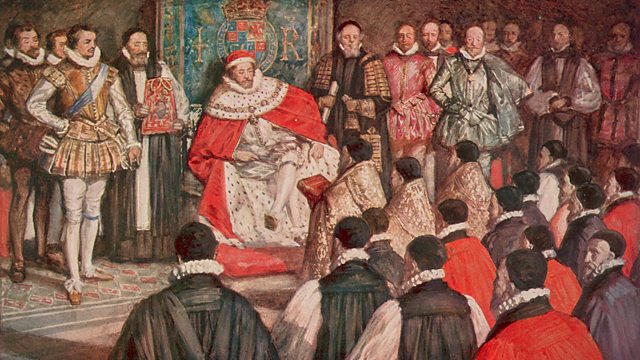The Commission
James Naughtie visits Hampton Court to tell the story of how and why King James commissioned a translation of the Bible that has become our "national epic.".
The King James, or Authorised, Version of the Bible remains the most widely published text in the English language. It has been called the "noblest monument of English prose" and has been recognised for centuries as both a religious and literary classic.
In the first of three programmes marking the 400th anniversary of its publication, James Naughtie tells the story of how and why King James VI of Scotland and I of England decided on a new translation of the Bible.
The programme is recorded at Hampton Court Palace. A conference here in early 1604 led to the commissioning of the King James Version. The Chief Curator at the palace, Lucy Worsley and James Naughtie walk the palace grounds, scene of so much Tudor and Stuart frivolity, and a refuge from the plague. Before the earnestness of the January conference there had been masques and feasting and Shakespearean drama. England was still revelling in its new monarch after the stultifying later years of Elizabeth's reign and breathing a sigh of relief that the accession had been a smooth one.
The Chapel Royal provides a fitting setting for James to discuss the position of the monarchy in Jacobean England with Professor Pauline Croft. The King sat in the Royal Pew, high above his bishops and clergy. James had written about his ideas of divine kingship in "Basilikon Doron," addressed to his young son.
In The Great Watching Chamber we hear about the religious background to James' reign. Elizabeth's death had lifted the lid on the tensions between the godly (Puritans) and the conformists (Anglican bishops). The godly had presented a petition to James on his journey from Scotland to London demanding the end to religious practices they found beyond the pale; wearing vestments, making the sign of the cross, the exchange of wedding rings, the power of the bishops. It was to address these concerns that James had called the conference.
We follow in the footsteps of the conference delegates through the palace and into the Kings state apartments. James Naughtie learns about the key characters at the conference - the pugnacious puritan-basher Bishop of London, Richard Bancroft, the great preacher and conformist Lancelot Andrewes and the leader of the Puritan delegation, John Rainolds. The Puritans had a delicate line to pursue, criticising the establishment and the episcopacy without undermining royal supremacy. But James was having none of it - "No Bishops, no King!" It was an ill tempered conference, with James harrying the protagonists on both sides. He was a brilliant theologian himself, and in him some of the most learned men in the country met their match.
The suggestion for a new translation of the Bible was made by John Rainolds. He was hoping to undermine the authorised Bishops Bible and elevate the Geneva version favoured by Puritans. James acceded to the request because he agreed that all the various translations on offer had their faults. A victory for Rainolds? Not so. James singled out the Geneva Bible, with its controversial marginal notes, as the worst of them all.
After the conference, Bancroft drew up the rules for translation, had them approved by the king, and brought together six companies of translators based in Oxford, Cambridge and Westminster.
Work began at once. Barely a year later the Gunpowder Plot traumatised England. It turned out to be one of James' finest moments as a statesman, and it gave impetus to his vision of a new translation of the Bible that could unite the country's church and people.
Producer: Rosie Dawson.
Last on
More episodes
Previous
You are at the first episode
Broadcasts
- Mon 3 Jan 2011 09:00麻豆社 Radio 4 FM
- Mon 3 Jan 2011 21:30麻豆社 Radio 4
Featured in...
![]()
Tudors and Stuarts
Dramas and documentaries on these two dynamic dynasties.
![]()
Shakespeare - Stratford Chalice
Shakespeare - Stratford Chalice
![]()
The Art of Monarchy - Faith
Art of Monarchy - Faith - Highlights from the Radio 4 collections


